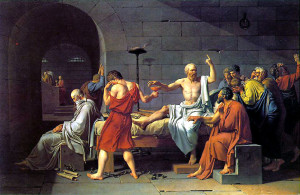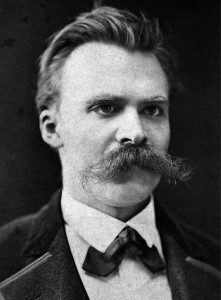Did Socrates need to die?
Do some voices need to be silenced?
Plato’s tales of Socrates have opened minds and revealed truths to a hundred generations. His death is the stuff of legends, but it may be we’ve missed its most important lessons.
If you’re unfamiliar with Socrates, boy, poor you! But it’s not too late! I’ll help you get started: Socrates is a character like no other in history or literature. A war hero in ancient Athens, it was announced by the highest authorities (i.e. the Priestess of Apollo, the Oracle at Delphi) that he was the wisest man in Athens. Knowing how confused he was himself, he argued this couldn’t be true, and sets out to prove it by speaking with the great leaders of Golden Age Athens, about justice, goodness, art and anything else that came up. With his probing questions, realizing that these great men were confused and contradictory on the very things they considered themselves expert, he reckoned he might be the wisest since at least he knew that he knew nothing.
He gathered about him a following of young Athenians, including many of the best and brightest, completely dedicated to him, reveling in his epic intellectual takedowns of the city’s pompous leaders, and the journeys of the imagination Socrates would guide them on.
That’s the gist of the myth of Socrates, but if you take the time to read his depiction in Plato’s stories, you can’t help fall in love with the man: a man so gentle, yet unequalled in personal strength and confidence, ridiculously curious and talkative, engaging friends and strangers in abstract conversations in every circumstance, asking his questions round and round in circles that suddenly get somewhere. He comes across as Columbo in a white robe. You can’t avoid the love his legions of followers had for him. To me, he is a proto-Jesus figure, with his own unique twists, and bits of First Blood Rambo, Ghandi, Mr. Smith Goes To Washington and Lenny Bruce.
(We’ll get more into Why Socrates Rules and how much historic accuracy there is in our knowledge of him in another post, but unlike Socrates, we’re trying to get to a point here!)
Now we come to his death: according to multiple sources, and portrayed across several of Plato’s dialogues, in his seventy first year, Socrates was charged with crimes against the State: of dishonouring the Gods and corrupting the youth.
The jury, of several hundred Athenian citizens, found Socrates guilty. At sentencing, Socrates makes a speech in his own ‘defense’ that is so offensive to the jury that MORE OF THEM VOTE FOR THE DEATH PENALTY THAN HAD ORIGINALLY VOTED GUILTY. In one part, when asked to suggest a fair penalty for his crimes, Socrates suggests free meals in Athens hall of honour for the rest of his life. (read The Apology, Socrates’ trial story).
Socrates is imprisoned to await the return of some religious pilgrims before his execution. There, one of his followers tells him he has bribed a guard and arranged with friends to steal him away to a foreign town where friends await him.
Socrates refuses, asserting the dishonor of cheating a system he had willingly lived under so long, and explaining at length the absurdity of a philosopher fearing death. (The jailroom scenes in Crito and Phaedo are beautiful, but Phaedo suffers from Socrates more long winded and antique-sounding speeches. Read both, but in Phaedo, skip the philosophy.)
Socrates spends his last moments cheering up his friends, discussing philosophy to the last. Finally, Socrates drinks his poison as his followers, and even the guard, cry.
The conventional wisdom is, Socrates good, jealous Athenians bad.
Why was such a great man, called the justest, bravest and wisest of his time, attacked by his own neighbours? I’ve seen the explanation given that several of Socrates’ young followers had gone on to become villains to the city (one had advised the Spartans in war against Athens, while others had been part of the short lived dictatorial oligarchy). Historians imagine Socrates had thus earned some general dislike-by-association from the general populace, while the city leaders had all been made by Socrates to look foolish at one time or another, and would have been eager for the chance to harm him.
But what if the jury were correct? What if Socrates had committed crimes against the state, and corrupted the youth? The way those pupils turned out doesn’t sound like some bad-luck circumstances for Athenians to dislike Socrates, it sounds like a justifiable charge of corrupting the youth.
It’s hard to pinpoint what in Socrates’ teachings could have been so destructive and threatening, but there are multiple possibilities. There is a powerful anti-authoritarian theme in his words. He demonstrates that those Athenians charged with matters of life and death were as ignorant as any. While he is clear that virtue and goodness are real, knowable, and the highest of values, and while he believes in a selfless promotion of justice, there is also a lot of nihilism in Socrates. Many of Plato’s dialogues end with no satisfactory resolution at all. That’s part of Socrates’ schtick: he always enters his Colombo like questioning of his friends as an ignorant naïf who really doesn’t have the answers. Sometimes this seems to be a clear bluff, but othertimes he seems content to talk for hours overturning theories without ever solving a problem (like, what is knowledge?). His thoughts on democracy are also complex: in many instances he ridicules the idea of trusting the most important questions to the general public rather than experts. If you had a medical problem, would you hold a referendum on what to do, or ask a doctor? On the other hand, he is clear in his admiration for Athens and its laws, and the striving for democracy was possibly Athens’ defining feature, at least in contemporary Greece. Is it possible that the questions Socrates asked, the mood he instilled, led (some of) his followers to betray Athens?
Could Socrates have realized this, and “thrown” his own sentencing with his offensive defense speech? Is this why he refused to escape, and drank the poison willingly? Was he guilty as charged?
It’s difficult for me to even approach this question, because I love Socrates.
There, I said it.
I love Socrates, and I don’t care who knows it, I’ll shout it from the rooftops! (I won’t say I believe the universe is as Socrates says it is. I just like his style. It’s amazing to me that a man like this could have lived.)
Maybe Socrates’ teachings weren’t compatible with Athens of that time. Maybe the leaders of Athens saw that their entire way of life and governance were threatened by the attitudes of Socrates’ students. Maybe they just didn’t get it, maybe Socrates’ ideas were themselves ‘good’ but if not understood correctly, they gave birth to wrong, dangerous ones. Or maybe the original ideas inevitably led to conflict with a democratic state.
Imagine if Athens herself could confront Socrates. She might say, All you say is true Socrates. But it is also my death knell! If you continue to spread these theories, you will destroy that which, in the real world, you love most: this city. I don’t know why it is, but I know I cannot withstand your truths if spoken aloud!
Nietzsche is often portrayed as an influence on the development of Nazism. Its an ignorant charge. The same accusation against Heideger is far more accurate. But Nietzsche’s a much bigger name, so we’ll go with him.
What if that accusation were true? What if a reading of, or an adherence to, or a logical extension of, the ideas of Nietzsche, led to Nazism, or similar ideologies?
Whole Lot of Crazy Eyes:
Imagine Nietzsche’s work led, even if obliquely, to cruel and dangerous ideas; if it could be seen in multiple historic occasions, and supported by analysis connecting Nietzsche’s works to Nazi-like ideology and behavior. Imagine the leaders of the genocide in Rwanda were found to be acolytes of Nietzsche. What then? Would we ban the teaching of Nietzsche? Would we teach it with warnings, accepting that many would then be able to learn it without proper guidance and thus be susceptible to “the bad” influence?
What if we had a living Nietzsche, or Socrates, much less under our control than a dead man’s legacy, and we felt by the influence of his words, that our own way of life was threatened?
This week, a Muslim preacher in Britain has been ordered to silence himself for his advocacy of sharia law, and his association with some unsavoury characters. (This incident a test case for Britain’s new Anti-Social Beaviour laws). It is an easy thing, for most of us, to support restrictions on free speech when the speech is directly calling for our destruction. But what if we added a bit of separation? If this preacher never mentioned his country, but the only conclusions of his religious interpretations were that Western democracies should be destroyed, how many criminal acts by his followers would we allow before banning his teachings?
In the real British case, the preacher seems to hate his country, while Socrates’ loved Athens. Perhaps they were equally dangerous.
Socrates loved Athens. Athens killed Socrates. I wonder if Socrates died to protect his love.





I have a list of people whose voices would be better if silenced. Can I send it to you?
Yeah, I love lists, so that would be great. Send me anything you’ve got actually. On second thought, don’t send me the list if I’m on it. You know what? Just forget the whole thing.
Piers Morgan
Bono
Al Gore